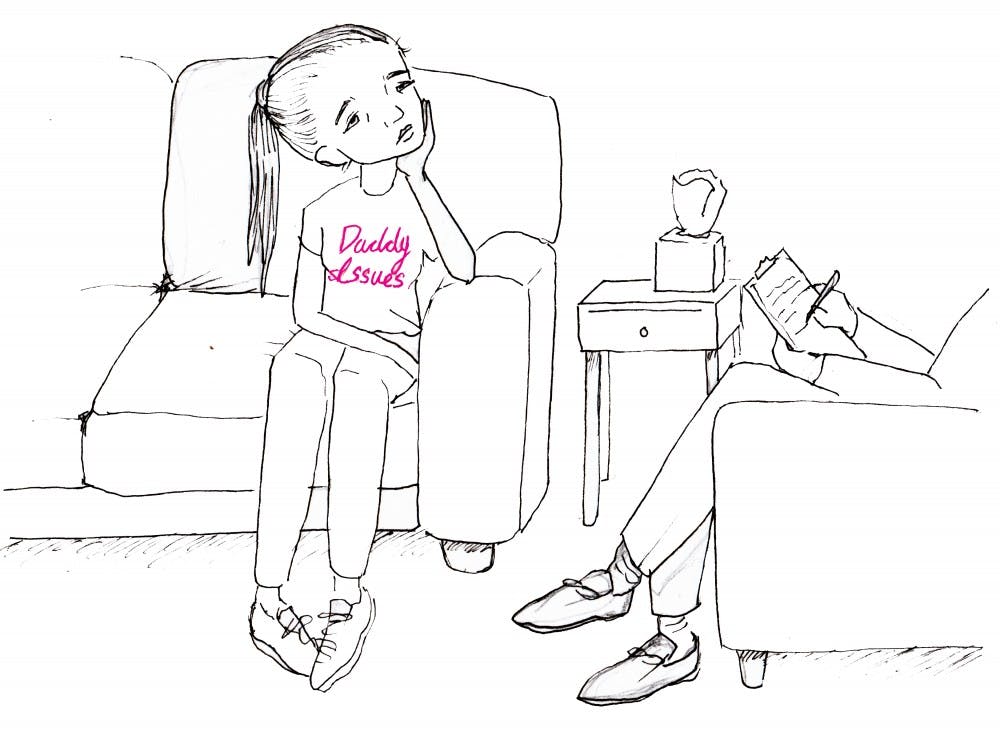There seems to be no end to the “daddy jokes" trend. These cringeworthy jokes appear on everything from Twitter to your favorite TV shows. While they might seem funny in the moment, there are real issues associated with the concept that need to be addressed.
This joke isn’t funny. It’s used as a means to mock and humiliate people. The idea of “daddy issues” is an abusive tactic used to manipulate and make light of a serious issue.
The concept of daddy issues originated from something called the Electra Complex, and later Penis Envy. It is basically the idea that women are jealous of men’s masculinity and therefore are unable to have healthy relationships with men.
Later, this morphed into daddy issues, which is the idea that if a person has a toxic relationship with their father, they will project all these issues onto their relationships, trying to find a substitute for a father figure.
Daddy issues jokes are generally used to demean someone’s relationship choices, and it is generally directed toward women, serving as a tool used to coerce and shame the target into doing what their partner wants them to do.
This gives almost anyone the potential to be the victim of this gross joke. Not wanting to sleep with someone, turning down a date or dating out of one’s age range have all been cause for a daddy issues joke.
Shaming someone for making their own relationship choices could harm a person's mental health. Specifically, people could feel ashamed for turning down a situation that makes them uncomfortable.
This shaming could lead to destructive relationships and low self esteem.
While our relationships with our families do influence our romantic relationships, they’re not the be-all and end-all for the determination of the health and success of those relationships. Ultimately, it's up to the individual to make healthy decisions regarding their relationships.
“We learn a lot about relationships with others from our parents. Our parents are our first teachers,” Daniel Wasserman, Ph.D. in Psychology said. “Although it doesn’t always happen in a straight line way, (people) can learn what they don’t want from their parents, and set about to do the opposite.”
Additionally, saying someone has daddy issues makes light of family abuse and it’s aftermath. Abuse isn’t funny, so we shouldn’t be joking about it.
By making daddy issues jokes, we effectively silence those who have dealt with abuse from their fathers. Joking about daddy issues makes victims of abuse even more reluctant to talk about their trauma stemming from an unhealthy relationship with their father.
By making these jokes, we’re mocking these victims' trauma. It’s not funny, it's cruel.
These jokes are also used to reinforce gender norms. Sexual forwardness, clinginess, confidence and body image issues are all considered “symptoms” of daddy issues.
Sorry to be the one to break it to you, but "daddy issues" jokes arent funny........at all.
— Cory ❄️ (@CCorynne) February 9, 2015
This will make any woman question whether or not she has daddy issues. Being accused of having daddy issues forces women to question their relationship choices and even their sanity. However, with such varying symptoms, any woman could have daddy issues.
Daddy issues jokes are uses as a gaslighting tool, used to manipulate the target into questioning their own perception and mental stability.
Daddy issue jokes serve no constructive purpose. At best they’re cheap and overused, and at their worst they are a tool used to manipulate and shame.
Reach the columnist at sljorda4@asu.edu or follow @skyjordan4 on Twitter.
Editor’s note: The opinions presented in this column are the author’s and do not imply any endorsement from The State Press or its editors.
Want to join the conversation? Send an email to opiniondesk.statepress@gmail.com. Keep letters under 300 words and be sure to include your university affiliation. Anonymity will not be granted.
Like The State Press on Facebook and follow @statepress on Twitter.




